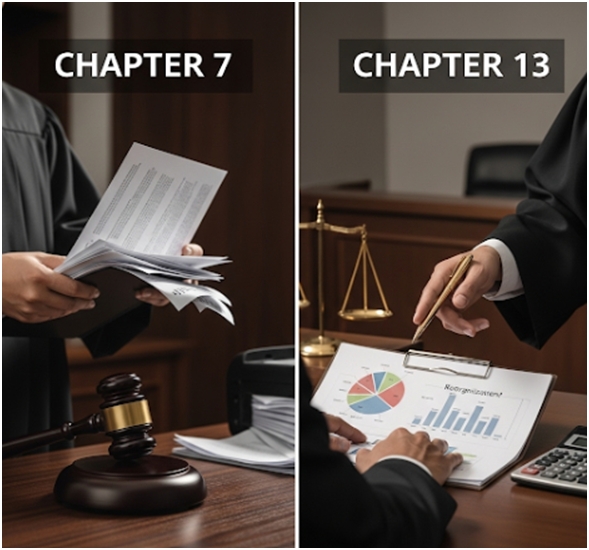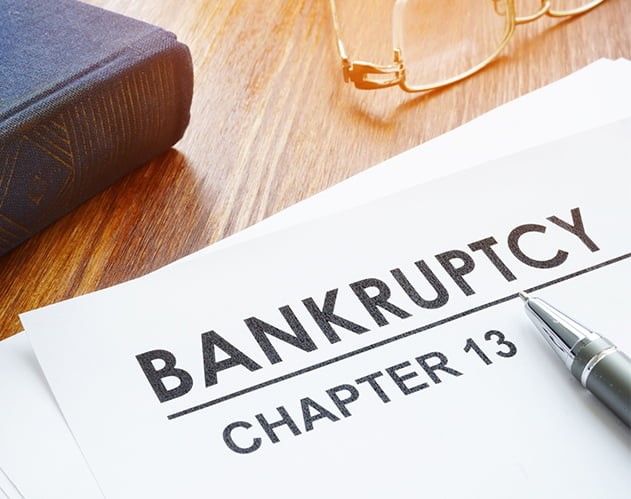Understanding Chapter 13 Bankruptcy
If you’re struggling with debt but want to protect your home, car, or other important assets—and have a steady income—Chapter 13 bankruptcy may be the right solution. This option allows you to reorganize your debts, catch up on missed payments, and create a manageable repayment plan. Our Bankruptcy lawyer helps clients file chapter 13 and fights IRS garnishment, creditor harassment and foreclosure in Collin County and Denton County, Chapter 13 is a legal process that allows individuals to reorganize their debts and create a plan to pay creditors back over time, offers significant benefits.

If you live in Collin County and are facing foreclosure, repossession, or owe back taxes, Chapter 13 can be a beacon of hope, providing much-needed relief and a chance to regain control of your finances.
In summary, Chapter 13 bankruptcy enables individuals in Collin County to reorganize their debt, protect their assets, and establish a realistic path toward financial stability through a court-approved repayment plan. Navigating Chapter 13 bankruptcy McKinney TX: Veronica Deaver
Key Features of Chapter 13 Bankruptcy in Collin County
Debt Reorganization: Unlike Chapter 7, which often involves selling your property to pay off debts, Chapter 13 lets you propose a manageable repayment plan to the bankruptcy court.
Regular Income Requirement: You must demonstrate a consistent source of income to qualify. This income funds your monthly payments throughout the plan period.
Structured Payment Plan: Your repayment plan details how much you’ll pay each month to your creditors based on what you can afford. The plan lasts three to five years.
Asset Protection: Chapter 13 is a shield for your property. If you’re behind on your mortgage or car loan, you can catch up on missed payments as part of your plan, ensuring your home is safe from foreclosure and your car from repossession.
Debt Limits: To be eligible, your unsecured debt (such as credit cards or medical bills) must be less than $465,275, and your secured debt (like mortgages and car loans) must be under $1,395,875 for 2025.
Role of the Chapter 13 Trustee: A court-appointed trustee will oversee your case, collect your payments, and distribute them to creditors according to the plan.
Filing Process: Filing for Chapter 13 bankruptcy involves submitting a petition to the court, providing detailed financial information, and creating your proposed repayment plan.
Key Benefits:
- Halt foreclosure or repossession proceedings
- Catch up on overdue mortgage or car payments
- Restructure other secured debts
- Repay back taxes or child support over time
Who Is Eligible for Chapter 13 Bankruptcy?
To qualify for Chapter 13, you must have:
- A steady, reliable income you can use to make monthly payments.
- Unsecured debts (like credit cards or medical bills) less than about $465,275.
- Secured debts (like mortgages and car loans) totaling less than about $1,395,875.

Chapter 7 vs. Chapter 13 Bankruptcy: What’s the Difference?
- Chapter 7 (Liquidation Bankruptcy): Your non-exempt assets may be sold to pay debts. The process is quick, usually lasting only a few months, but you could lose valuable property.
- Chapter 13 (Reorganization Bankruptcy): You keep your assets and pay debts over time. This option is suitable for individuals with a steady income who wish to protect their home, car, or other essential assets.
The Role of the Bankruptcy Trustee
Understanding Bankruptcy for Homeowners: Safeguarding Your Most Valuable Asset A court-appointed bankruptcy trustee manages your case and ensures fairness for both you and your creditors. They:
- Review your proposed repayment plan
- Collect your monthly payments
- Distribute money to creditors
- Handle objections from creditors and communicate with the court
The trustee helps keep everything running smoothly and makes sure you meet your obligations.
When Should You Consider Filing Chapter 13?
Signs You May Need Chapter 13:
- You’re falling behind on the mortgage or car payments.
- Debt continues to accumulate, even after regular payments are made.
- You’re facing foreclosure, repossession, or wage garnishment.
- Major life changes—job loss, medical bills, divorce—have shaken your finances.
If you recognize these warning signs, Chapter 13 could help you reorganize, stop creditor actions, and protect your assets.
Evaluating Your Finances Before Filing
Are You Considering Filing a Bankruptcy- Start Here Before filing, take a close look at your income, expenses, and debts to see if you can realistically follow a repayment plan. Making a simple budget can reveal extra money for payments. It’s also wise to consult with a bankruptcy attorney or financial advisor. They can explain your options and help you determine if Chapter 13 is the best path forward for you. Can Chapter 13 Take My Disability Back Pay
Timing Matters
The timing of your bankruptcy filing can impact the outcome. Filing before a foreclosure sale or wage garnishment can halt those actions right away. However, you should consider the effects on your credit score and future borrowing. Discuss these factors with an expert to choose the right timing for your situation.
How Chapter 13 Process Works
- Consultation
Meet with a bankruptcy attorney to review your situation and options.
- Gather Documents
Collect records of your income, expenses, debts, and assets.
- File Your Petition & Plan
Submit bankruptcy forms and your proposed repayment plan to the court.
- Meeting of Creditors
Attend a court meeting where the trustee and creditors can ask about your finances.
- Confirmation Hearing
A judge reviews and approves your plan, and you start making payments.
- Consistent Payments
Make your plan payments for three to five years. If successful, remaining eligible debts are discharged at the end.
Creating a Repayment Plan
Your repayment plan must show:
- How you’ll pay off some or all of your debts
- How much will your monthly payments be (based on your disposable income)
- How you prioritize secured debts like mortgages and car loans
Court Hearings and Legal Process
Court hearings ensure everything is fair and legal. You’ll need to provide honest information and attend court dates. Having an attorney represent you is highly recommended—they can help navigate the process and address any issues that may arise.
Life After Chapter 13
Rebuilding Credit: After finishing Chapter 13, it takes time and good money habits to rebuild your credit score. Paying bills on time, using secured credit cards, and sticking to a budget will help you recover financially.
Keeping Your Assets: Unlike Chapter 7, you can typically keep your house, car, and other essential items if you follow your payment plan. Your co-signer may also receive some protection.
Ongoing Obligations: You may have reporting or counseling requirements after discharge. Staying organized and proactive ensures long-term financial stability.
Common Chapter 13 Myths
- Myth: I’ll lose all my belongings. Fact: You keep your assets if you stick to the plan.
- Myth: My credit will be ruined forever. Fact: Bankruptcy can negatively impact credit, but many individuals successfully rebuild their credit within a few years.
- Myth: You can’t convert to Chapter 7. Fact: It’s sometimes possible, with court approval and meeting eligibility standards.
Chapter 13 FAQs
- How long does it last? Typically 3–5 years, depending on your plan.
- Will it affect my credit score? Yes, but the impact lessens as you demonstrate good financial habits.
- Can I switch to Chapter 7? Sometimes, if your circumstances change and you qualify.
For more information, consult a bankruptcy attorney or visit reputable government websites, such as the U.S. Courts or the FTC. Thinking about Chapter 13 bankruptcy in Collin County, TX? Call our attorney to find out if it’s the right time for you.


